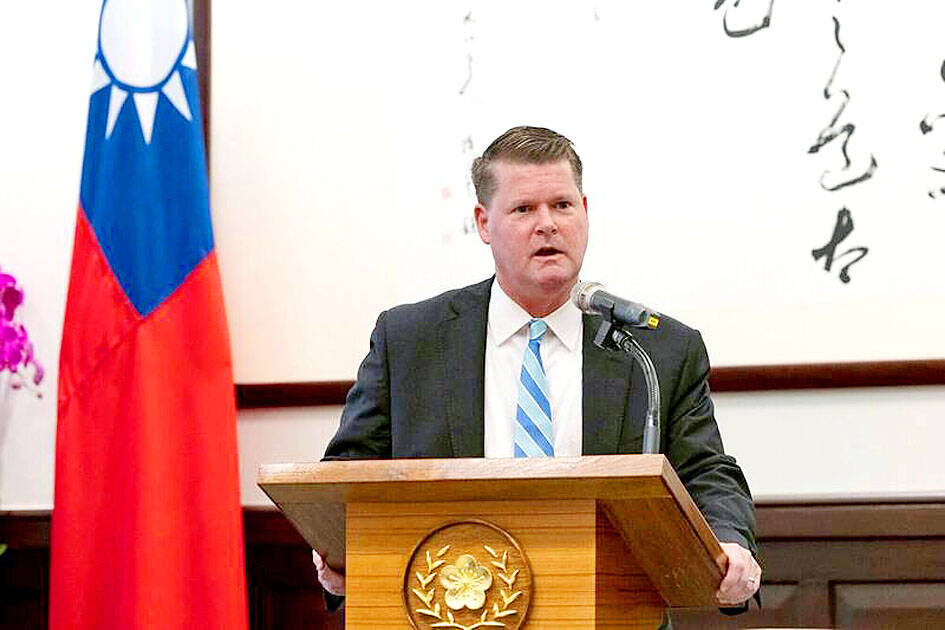US President Donald Trump will likely approve the first arms sale to Taiwan of his second term after Taipei passes its special national defense budget, a former US defense official said on Tuesday.
Randall Schriver, a former US assistant secretary of defense for Indo-Pacific security affairs, told the Central News Agency (CNA) that “a lot will depend” on whether Taiwan passes the special budget, which is expected to be introduced later this month.
“If it’s as large as Taiwanese officials are suggesting, then I think there will be a lot of support in the United States for approving those sales,” Schriver said, adding that it would make “no sense” to ask Taiwan to raise its defense spending and then not approve weapons sales.

Photo courtesy of the Presidential Office
President William Lai’s (賴清德) administration has proposed earmarking NT$113.2 billion (US$3.69 billion) for national defense as part of a NT$550 billion special budget to extend the nation’s wartime reserves from 30 days to 120 days. It has also proposed hiking defense spending to NT$949.5 billion, or 3.32 percent of GDP, next year, although both proposals are likely to face scrutiny in the opposition-controlled legislature.
Schriver, chairman of the Institute for Indo-Pacific Security, said that while Taiwan’s defense spending commitments should be “applauded,” the focus should be on how the money is spent, rather than how much.
Aside from expanding military-to-military training programs, the US should widen its focus beyond an invasion scenario and help Taiwan counter Chinese “gray zone” activities, he said.
In practice, this could involve selling Taiwan capabilities that are less useful in an invasion scenario, such as E-2D Hawkeye airborne early warning aircraft or MH-60 helicopters, he said.
On the possibility of joint US-Taiwan weapons production, which US Senator Roger Wicker said he expects to occur, Schriver said it would help address the shortages the US faces both for its own military and those of its partners.
More production capacity would be helpful for both sides, and more in Taiwan, specifically, would mean that those weapons would not have to be brought in by ship or air in the event of a crisis, he said.
CNA also asked Schriver about concerns that Trump might use Taiwan as a bargaining chip, given his transactional approach to diplomacy. Media reports in the past few months said that Trump had blocked a military aid package to Taiwan and a proposed stopover by Lai as he negotiated a trade deal with China.
Despite these issues, Schriver said he had “not seen any indication that Taiwan is going to be dumped or bargained away.”
While transactional, Trump “does not take bad deals,” and would thus be unlikely to agree to anything that makes [Chinese President] Xi Jinping [習近平] look stronger or gives China the upper hand, Schriver said.

Taiwan has received more than US$70 million in royalties as of the end of last year from developing the F-16V jet as countries worldwide purchase or upgrade to this popular model, government and military officials said on Saturday. Taiwan funded the development of the F-16V jet and ended up the sole investor as other countries withdrew from the program. Now the F-16V is increasingly popular and countries must pay Taiwan a percentage in royalties when they purchase new F-16V aircraft or upgrade older F-16 models. The next five years are expected to be the peak for these royalties, with Taiwan potentially earning

STAY IN YOUR LANE: As the US and Israel attack Iran, the ministry has warned China not to overstep by including Taiwanese citizens in its evacuation orders The Ministry of Foreign Affairs (MOFA) yesterday rebuked a statement by China’s embassy in Israel that it would evacuate Taiwanese holders of Chinese travel documents from Israel amid the latter’s escalating conflict with Iran. Tensions have risen across the Middle East in the wake of US and Israeli airstrikes on Iran beginning Saturday. China subsequently issued an evacuation notice for its citizens. In a news release, the Chinese embassy in Israel said holders of “Taiwan compatriot permits (台胞證)” issued to Taiwanese nationals by Chinese authorities for travel to China — could register for evacuation to Egypt. In Taipei, the ministry yesterday said Taiwan

Taiwan is awaiting official notification from the US regarding the status of the Agreement on Reciprocal Trade (ART) after the US Supreme Court ruled US President Donald Trump's global tariffs unconstitutional. Speaking to reporters before a legislative hearing today, Premier Cho Jung-tai (卓榮泰) said that Taiwan's negotiation team remains focused on ensuring that the bilateral trade deal remains intact despite the legal challenge to Trump's tariff policy. "The US has pledged to notify its trade partners once the subsequent administrative and legal processes are finalized, and that certainly includes Taiwan," Cho said when asked about opposition parties’ doubts that the ART was

If China chose to invade Taiwan tomorrow, it would only have to sever three undersea fiber-optic cable clusters to cause a data blackout, Jason Hsu (許毓仁), a senior fellow at the Hudson Institute and former Chinese Nationalist Party (KMT) legislator, told a US security panel yesterday. In a Taiwan contingency, cable disruption would be one of the earliest preinvasion actions and the signal that escalation had begun, he said, adding that Taiwan’s current cable repair capabilities are insufficient. The US-China Economic and Security Review Commission (USCC) yesterday held a hearing on US-China Competition Under the Sea, with Hsu speaking on